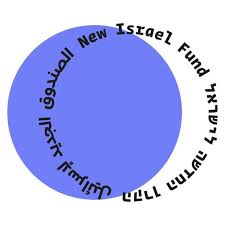We approach Shabbat with heavy hearts, mourning the loss of two young people, Sarah and Yaron.
Sophie Milman performs Eli, Eli, the poem of Hannah Senesh. May we find peace this Shabbat, for us and everyone.
Shabbat Shalom
#BringThemHomeNow
We approach Shabbat with heavy hearts, mourning the loss of two young people, Sarah and Yaron.
Sophie Milman performs Eli, Eli, the poem of Hannah Senesh. May we find peace this Shabbat, for us and everyone.
Shabbat Shalom
#BringThemHomeNow
We mourn the tragic deaths of Sarah Milgrim and Yaron Lischinsky
murdered outside last night’s AJC event.
I had the honor of moderating a conversation for the New Israel Fund (NIF) at Beth Am Israel, located on the Main Line in suburban Philadelphia.
 Our speakers, Rabbi Noa Sattath and Libby Linkenski are dedicated to fostering a shared society that upholds our Jewish values. Our values endure, even in challenging times like these, when they are stressed and tested as rarely before in our history. Indeed, our values are more important than ever for maintaining perspective. Libby shared three points to remember as we navigate these difficult times:
Our speakers, Rabbi Noa Sattath and Libby Linkenski are dedicated to fostering a shared society that upholds our Jewish values. Our values endure, even in challenging times like these, when they are stressed and tested as rarely before in our history. Indeed, our values are more important than ever for maintaining perspective. Libby shared three points to remember as we navigate these difficult times:
Palestinians are not Hamas. Israelis are not Benjamin Netanyahu. Americans are not Donald Trump. We are more than the actions of our extremist leaders and are not directly complicit in their worst acts.
The conflict didn’t begin on October 7, and October 7 itself was indefensible. So is the ongoing assault on the people of Gaza. We can’t lose our moral clarity, regardless of politics.
Two peoples have always existed between the river and the sea, and both will continue to exist. Any vision that erases one side is a vision of unimaginable violence. The question is not whether we coexist but how. That’s where the conversation begins—and where it must end.
We must continue working to lay the foundation for a future where both people can live with dignity and security.
 As we gather around the Seder table, we find ourselves in a moment that feels uniquely challenging. While previous generations have confronted serious issues, the current landscape is unlike anything we’ve encountered in recent memory. The ongoing war is relentless, with no end in sight and no plan for what follows. Hostages remain trapped, seemingly without hope for redemption. Furthermore, we are witnessing a rise in anti-Israel sentiment, along with a resurgence of Antisemitism not just abroad but right here in the United States. Fear and anxiety permeate our lives, and rather than coming together to confront these threats, we often find ourselves at odds with each other. This moment in time is fraught with tension.
As we gather around the Seder table, we find ourselves in a moment that feels uniquely challenging. While previous generations have confronted serious issues, the current landscape is unlike anything we’ve encountered in recent memory. The ongoing war is relentless, with no end in sight and no plan for what follows. Hostages remain trapped, seemingly without hope for redemption. Furthermore, we are witnessing a rise in anti-Israel sentiment, along with a resurgence of Antisemitism not just abroad but right here in the United States. Fear and anxiety permeate our lives, and rather than coming together to confront these threats, we often find ourselves at odds with each other. This moment in time is fraught with tension.
However, we have the power to respond constructively, with unity and compassion.
By gathering at the Seder table, we embody the spirit of inclusion with our declaration: “Whoever is hungry, come and eat!” This Passover, our hunger for spiritual and emotional support is palpable. Let us set aside our differences to share and celebrate the profound story of our people’s redemption, recognizing that each of us connects to this narrative in our own distinctive way. Our tradition highlights four individuals asking different questions—a reflection of our diverse perspectives. We ought to welcome one another, fostering an environment of understanding even amidst spirited discussions. The Shalom Bayit, the peace of the Seder table, and our unity must prevail. Now, more than ever, we need each other. This Passover, let us cherish our time with family and community, share the powerful story of redemption and freedom, and be grateful that we have one another in these trying times.
Wishing you a Zissen Pesach!
 The manger scene of the Baby Jesus swaddled in a Keffiyeh has created much commotion and attention. Even though the Vatican has removed the display, the consciousness-raising alone means that the image has had the intended effect.
The manger scene of the Baby Jesus swaddled in a Keffiyeh has created much commotion and attention. Even though the Vatican has removed the display, the consciousness-raising alone means that the image has had the intended effect.
We are talking front and center through religion about the plight of the Palestinian people.
This is not the first time someone has reinterpreted something for their own purpose. I have seen many iterations of Jesus: white, very white, swarthy, black. Many religions that have Jesus at the center of their theology have him displayed realistically on the cross, his body cradled in his mother’s arms, lovingly gazing down upon us in a portrait or looking upwards in an icon. As a babe in mother’s arms, as a man spreading the Word, at a bountiful supper, and as a martyr. And now swaddled in a keffiyeh. We use religious symbols to motivate the audience toward a vision or narrative. This is frequently for good and exemplary purposes and too often for malicious purposes.
The charge that this current manger display is Antisemitic is a particular, not universally shared Jewish perspective. Some deliberately embrace that evil message. I am sure that was not the intent of the Pope or the Church. And if the manger is allowed to be a message of hatred, it will have failed miserably in its mission.
Raising awareness of the plight of the Palestinians is important. Christmas is an essential Christian symbol of God’s love and our hope. Peace on Earth and Goodwill towards men is the universal message of the extraordinary celebration.
Can this awareness-raising symbol be channeled into constructive forces to promote the welfare of the Palestinian people, who have been victimized for too long? It is time for the people of goodwill to lay down their arms and reach out across the divide to each other. May love supplant the hatred that has kept both sides at war for too long. May the promise of Christmas resound in that troubled place of Jesus’ birth so that two people learn to live together in peace and security.
Merry Christmas!
Jews are using the phrase “we are the canary in the coal mine” as a warning that anti-Semitism signals growing hatred of all groups in our nation. This idea is profoundly flawed, ironically counterproductive, and requires immediate redress.
anti-Semitism signals growing hatred of all groups in our nation. This idea is profoundly flawed, ironically counterproductive, and requires immediate redress.
The phrase is a desperate appeal to others that they must fight anti-Semitism as it inevitably will lead to hatred against them—that tactic won’t work. People will stand against anti-Semitism because it is wrong. And if they can rationalize anti-Semitism, they won’t care about Jews, canaries, or anyone else. Besides, there is another group that already experiences an institutional brand of hatred: black people and others of color.
People of color have been experiencing hatred and systemic racism for as long as any of us have come to these shores. When we think of Jews as the ones on the front line, we negate the experience of the black community. That is egotistical and shameful and ironically belies the idea embodied in the Canary Phrase. We should be aware of this hatred and align with those others who experience it.
I am not a canary, and I am not in a coal mine. Despite the alarming sharp increase in public displays of anti-Semitism, we live well, thoroughly enjoying so many blessings of this place. We have the power and the means to defend ourselves. And we are. Others do not, and we must help them.
Let us stand against hatred in all its forms besides every one of goodwill. We denounce hatred of any group and work together to fight it on the streets, in the courts, and our hearts. So our country may live up to its aspirations.
We are not birds; we are American Jews standing tall for the values we believe in, and together, we will prevail.
In response to the Bryn Mawr Film Institute’s decision to cancel the showing of the film The Child Within Me, I make the following statement:
To the Board of the Bryn Mawr Film Institute
You squandered an essential moment of leadership.
Until this decision, you were a cultural icon and an important voice in our community. But instead of devotion to keeping culture accessible through film, its thoughtful curation, and presentation, you cowed in the face of political pressure. You canceled a film thoroughly unrelated to the war. The only controversy about this film is your decision to condemn it because the Israeli Film Festival sponsors it. Shame on you.
People protesting against the showing of a film is an act of free speech. It does not automatically devolve into violence, and using that as a pretense for canceling is a sign of it is either fecklessness or outright bias against Jews (also known as Antisemitism) and Israel.
Protesters are loud and obnoxious, but they are not violent. Those who attend the festival would find them uncomfortable, but they are not a physical threat. Further, the police of Lower Merion would have done an excellent job of keeping the peace even in this potentially testy situation.
BMFI was an important institution, one I enjoyed participating in and supporting. However, I am deeply disappointed that you have focused on other aspects, neglecting the crucial role of bringing influential films into our community. This decision has undermined the basis for our relationship. I resign from my membership and call on everyone in our community to do the same.
Sincerely
Rabbi David Levin
The synagogue offered the following public statement in response to the swastika graffitied on the property:
We do not know who did this. We do know that they wanted us to be afraid. A swastika is not a commentary on the policies of the State of Israel, nor is it a sign of solidarity with Palestinians. It is a symbol of hatred and division. We, the leadership of the synagogue, want everyone to know that we will not give in to either fear or division. We are blessed to live in a society in which hate speech is not tolerated by the police, who are working with us to keep us safe. We are blessed to live in a society where our neighbors of other faiths have already reached out to offer support.
Chanukah has finished, and almost Shabbat is here.
The Maccabeats share a great song to take us into Shabbat.
Shabbat Shalom
 Yes, the presidents of Harvard and MIT should also resign. Because it really does depend on the context.
Yes, the presidents of Harvard and MIT should also resign. Because it really does depend on the context.
Free speech is not the unfettered ability to say anything. Free Speech on campus should be balanced against the needs of the students to attend school without threat or harassment. 
Advocating for Genocide is despicable. Although the University is a free marketplace of ideas, calling out for the extermination of Jews on campus is the furthest from a safe and secure space for Jews as there can be. For those presidents unaware of Jewish history, 6 million Jews were slaughtered during the Holocaust. So, Genocide is an exceptionally loaded concept.
The inability to understand the context of this issue and articulate it during an appearance before Congress demonstrates the incompetence of these people to fulfill the role of president at these Universities. If Harvard and MIT are okay with that, that is on them, but they also demonstrate shameful behavior and terrible judgment.